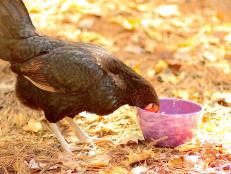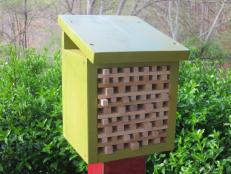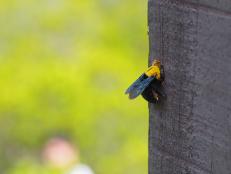How to Keep Your Chickens Safe


Melissa Caughey
All backyard flocks at some point in time will be visited by predators.
Chicken keeping is such a wonderful hobby for anyone with a small amount of space in the backyard or garden and a desire for fresh eggs (and entertainment). Whether you keep chickens in the countryside, city, or somewhere in between, one of the most important things you can do to keep your flock safe is to protect them from predators.
Predators are active both during the day and night. They come in all shapes and sizes and can attack a flock from the sky, at ground level or by digging. Types of predators that might put your flock at risk vary depending on where you live. Therefore, it is important for you to investigate what predators your flock might be facing in your area. Some predators are after chickens, eggs and sometimes both. Common chicken predators include birds of prey (hawks, eagles, owls), raccoons, opossum, snakes, rats, skunk, fox, coyote, bear, weasels, minks, fisher cats, bobcats and badgers. It is also not uncommon for chickens to be attacked by feral cats or even the family dog.

Melissa Caughey
Chickens are most vulnerable to attacks when they are free-ranging about in the yard and gardens. Supervising them when they are out and about can help to deter attacks. However, sometime predators can even attack chickens in the safety of their own home. Here are some ideas to consider to keep your chickens safe.
- Avoid chicken wire. Surprisingly, chicken wire was designed to keep chickens in but not predators out. Some predators, like fisher cats, raccoons and snakes, can easily access your chickens through the larger links in the wiring. Instead of chicken wire opt for 1/2 inch hardware cloth instead.
- Consider diggers. Some predators, such as fox and coyotes, can access the coop in minutes by easily digging underneath the enclosed outside portion of their housing (chicken run). To help combat this type of behavior, simply surround the chicken's run with a 2 foot wide apron of hardware cloth. Bury it a few inches below the ground's surface. Or you can bury the hardware cloth straight down 12-18 inches deep into the ground.
- Put a roof on it. Predators that fly or climb can access the coop through an uncovered "ceiling" in the outdoor run. Placing a roof over the run is the best way to keep predators from landing or climbing into the chicken run. Netting can also help to deter but it is not always failproof.
- Batten down the hatches. Every day, be sure the chickens are safely locked into their coop from nightfall until morning. Also inspect the coop and repair any small holes. These are access points for sneaky predators such as rats, weasels and snakes.
- Use quality locks. Replace easy open latches with predator proof ones. Many of them have a two-step locking and unlocking mechanism. Keep in mind that raccoons can figure out locks that 2-year-old children can!
- Consider a rooster. Although roosters are not for everyone they do a wonderful job at keeping their girls safe from danger. When a threat arises it is not uncommon to see a rooster ushering his flock to safety and then returning to fight and fend off threats.
- Install motion activated lights. Nighttime predators do not care for well-lit areas. They prefer to "work" under the cover of darkness.
- Electrify it. If you live in an area with large predators, such as bears or bobcats, consider surrounding the coop and run with electric fencing.
Over my years of keeping chickens, I have realized that predators can be incredibly lazy. At some point, one or more will pay your flock a visit. However once they realize your flock is well protected and secure, they tend to move on in search of easier prey. By taking these few simple steps, you are on the way to keeping your chickens safe, happy and healthy.













































